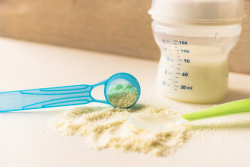
Anna, who hopes to become a neonatal intensive care unit (NICU) nurse, grew up in El Dorado and still calls it home with her husband and two daughters, Magnolia and Violet. When Anna and her husband were first married, they were told they would not be able to have children, so they were surprised to learn that she was pregnant — with twins!
Anna was pregnant at the beginning of the pandemic. It was a difficult financial time for her family. When the pandemic started, they became a one-income household. Anna was no longer working, and at the same time, her husband had trouble finding steady employment.
Soon after she became pregnant, Anna’s mother talked to her about the WIC program and other programs she knew of to help families with low incomes. The Special Supplemental Nutrition Program for Women, Infants, and Children (WIC) is a federal program that provides nutrition advice, food assistance, and health referrals to low-income pregnant, postpartum, and breastfeeding women; and infants and children up to age 5 who are at nutritional risk. But Anna forgot about the WIC program until after her twins were born.
Magnolia and Violet were born premature and spent time in the NICU. Anna lived at the hospital with the twins until they were able to come home. While she was at the hospital, Anna saw the passion and dedication of the nurses and doctors. It helped her realize she would like to become a NICU nurse herself one day and help other babies and families.
As Anna planned to return home with the twins, she learned they would need special formula for babies who are premature. A big expense. Her mother reminded her of the WIC program, and that it would cover much of the cost of the formula Magnolia and Violet would need. Anna and her husband decided to apply.
In Arkansas, the WIC program is run by the state Department of Health (DHS). Prior to the pandemic, the only way to apply was in person at the office. The state received waivers from the federal government during the pandemic allowing applicants to be approved without an in-person application. This change was critical for Arkansans needing assistance, as the state shut down most offices for some months early on in the pandemic. Anna said most of the application process happened over the phone. And it was a difficult process at times. Because her husband did not have steady employment, it was difficult to gather the information they needed to prove their income. She did have to go to the Department of Health for a checkup with a nurse. During the pandemic, the waiting room was eerily silent. Not what you would normally expect at the Department of Health. Anna said that the staff at the department could have been a bit nicer. It was already a time of uncertainty, and good customer service would have gone a long way.
But once Anna’s family was approved, the program made a big difference. When her daughters were infants, WIC provided the special formula they needed. And now, with WIC vouchers, the program helps her buy fruits and vegetables for their family. Which makes Magnolia and Violet happy — they love fruit!
WIC has been helpful in other ways, too. Earlier in the year, when Anna was concerned with a series of baby food recalls, the University of Arkansas for Medical Sciences Following Baby Back Home Program connected Anna with the WIC office in Little Rock. Staff at the WIC office was able to answer her questions about the recalls. Anna would like to see WIC do more outreach about all the different programs they provide, like lactation consultants, because she doesn’t think people are aware of all the ways WIC can help.
The food packages provided by WIC, which include staples like bread and milk, have given Anna’s family peace of mind. No matter what else is happening, even if her family is worried about paying for rent, Anna knows that she will have food for the twins.
